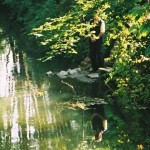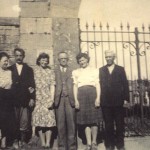In 2003, I went to Belgium with a friend and her husband whose name is Trevor. Our quest was to try to find any information about what had happened to Trevor’s father who was lost in Belgium in WWII.
There were a few things we knew for sure. Trevor’s father, an English gunner, had been wounded during the D-Day invasion, sent back to England to recover and then, with three other soldiers, had returned to the continent to rejoin his regiment. We knew that, somewhere along the way, one had been wounded and the others had been taken prisoner by the Germans and held in a farmhouse somewhere around Yvoir in the Meuse Valley. We also knew that two of them had been shot and buried along with a Belgian resistance fighter in the communal cemetery in Dorinne, a nearby village. No trace of Trevor’s father had ever been found.
So, armed with a couple of photos that Trevor’s mother had taken, we talked to people in the tourist office, the Archives and other government offices. What we encountered in our search, gave us cause to reflect just how horrible war is and how so many people are touched by it.
The owners of our B&B had a friend in Dorinne. We met with him and he guided us around the village. First, we went to the cemetery and spent several moments standing at the graves of the two English soldiers and the Belgian political martyr with tears streaming down our faces for what had been lost and for the lives cut short too soon. How different their lives would have been if Peter Bouquet (age 23) had lived to fall in love and if Arthur Bolewell (age 34) had been able to grow old with his wife. Here I was crying for two English soldiers I had never known.
Afterwards, we were taken to the house of a man who had been a teenager in 1944. He had helped move the bodies of the two soldiers to the village for burial. We hoped that maybe he might have heard something of that other soldier, the one never found. We got to ask our questions but, unfortunately, he had no information about Trevor’s father. What he did give us, however, was a copy of the diary he had kept during the summer of 1944. It talked about bombs dropping on nearby villages; German troops strafing the houses; American tanks rolling in; the discovery of the two English soldiers found shot in the nearby Bois de Chansin; and an American pilot who, after repairing his plane, did some aerial acrobatics before finally saying au revoir to the children who were watching.
Now, at least, we knew that the soldiers had been shot in the woods located in the ravine between the villages of Dorinne and Durnal. We had actually driven through several times admiring the forest and the stream running through it.
 So, we never did find out anything specific about Gunner Charles Alfred Norris but, on our last morning in the area, we bought four roses. Trevor laid one on the each of the three graves in the Dorinne cemetery in honour of those men none of us knew but whom we felt somehow connected to. The fourth rose Trevor placed in the little stream running through the Bois de Chansin in the ravine. As we watched it float away, we all cried for the father he never really knew and for one soldier among thousands and thousands who had given his life for his country and the Commonwealth.
So, we never did find out anything specific about Gunner Charles Alfred Norris but, on our last morning in the area, we bought four roses. Trevor laid one on the each of the three graves in the Dorinne cemetery in honour of those men none of us knew but whom we felt somehow connected to. The fourth rose Trevor placed in the little stream running through the Bois de Chansin in the ravine. As we watched it float away, we all cried for the father he never really knew and for one soldier among thousands and thousands who had given his life for his country and the Commonwealth.
















